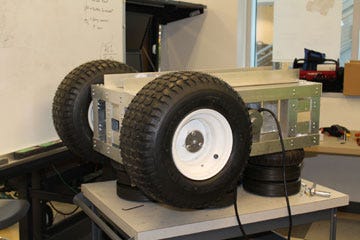
Doctor Mohamed Khabou and Doctor Ashley Cheng help students create what science fiction has already dreamed. They teach and work in the Science and Engineering building at the University of West Florida in the Unmanned Systems Lab. The lab is involved in all manner of unmanned projects and competitions based in space, the air, the land, above the sea and below. Walking amongst the ceiling-high work stations, the lab is replete with computers, pieces of planes and ground vehicles, rolling parts cabinets covered in wires and gears, and a robot. While military applications for these projects are familiar to the public, Khabou said lab students are working on a robot to give tours and a bartending robot that could check identification before serving alcohol. Senior Jeremiah Seames on the Florida University Satellite (FUNSat) Project said the team chose a magneto-resistive random access memory (MRAM) chip for the satellite's payload to see how it survives the heat of breaking the earth's atmosphere. He said the team's satellite will have a better chance of getting picked by using this memory since NASA is interested in using MRAM to store pictures taken in outer space and needs to know how that heat affects those memory chips. Khabou said, "Students have to be prepared for technologies like unmanned driving." According to an article by James R. Healey of USA TODAY and Kelsey Mays of Cars.com, Lexus quit offering self-parking options in 2012, but Toyota sells the feature as a Prius V option and Ford sells it as a stand-alone feature in the Ford Focus Titanium. Khabou said these competitions represent the seniors' capstone design projects. The lab's unmanned boat, "Saboatage" July 8 through July 13 will be in the Association for Unmanned Vehicle Systems Internation (AUVSI) Foundation and the Office of Naval Research (ONR) 7th Annual International RoboBoat Competition. June 18 is competition day for the AUVSI Student Unmanned Air Systems (UAS) Competition. June 6 through June 9, a five-member team from the lab is looking to win the Intelligent Ground Vehicle Competition (IGVC), which means recognizing colored flags, avoiding obstacles, navigating to GPS waypoints, and carrying a 20 pound payload.
This article originally appeared on Santa Rosa Press Gazette: Preparing for future technologies
